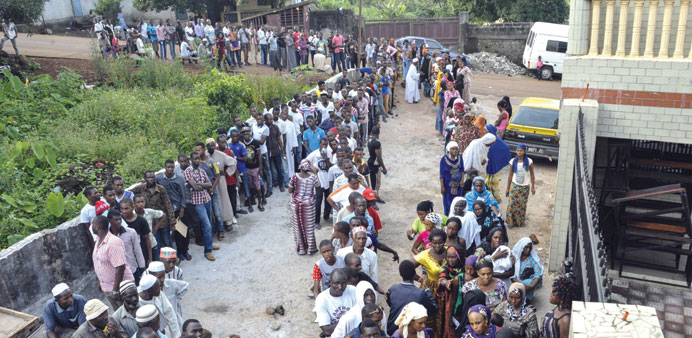AFP/Conakry
Guineans flocked to the polls yesterday to choose their president, shrugging off deadly pre-election violence though the opposition vowed to dispute the outcome.
Incumbent President Alpha Conde, the country’s first democratically elected president who is tipped to win a second term, led appeals for calm after around a dozen people were killed in deadly clashes between rival camps on Thursday and Friday.
The opposition is claiming the elections are not free and fair, raising fears of post-vote clashes. Ballots in 2010 and 2013 were marred by violence and accusations of fraud.
Speaking after voting in Kaloum, the administrative district of the capital Conakry, Conde said: “I ask all Guineans, whatever their party, to fulfil their civic duty peacefully and calmly.”
Polls were to close for the nation’s 6mn voters at 1800 GMT, with results of the first round not expected until at least tomorrow.
Former prime minister Cellou Dalein Diallo, leading the pack of seven challengers to the incumbent, said after casting his ballot in a Conakry suburb: “We must hope there will not be (violence) after the elections and that the people of Guinea show maturity.”
Diallo, head of the Union of Democratic Forces of Guinea (UFDG) party, earlier reversed a call for the polls to be postponed over fears of fraud.
Conde, referring to the Ebola outbreak that has ravaged the poor west African country, said: “After the Ebola epidemic, Guinea really needs to unite to get back to moving forward.”
The outbreak began in Guinea in December 2013 and spread to neighbouring Sierra Leone and Liberia before finally slowing early this year. Some 2,500 people have died in Guinea alone.
Conde, now 77, won the country’s first democratic elections in 2010 after spending some 30 years in exile, but they were marred by violence and accusations of fraud, as were legislative polls in 2013.
The incumbent, whose campaign slogan promises to deliver a “KO blow” to his opponents, is hoping to trade on his five-year record of reforms.
Among his achievements he cites an overhaul of the army and judiciary, the completion of a hydroelectric dam and reforms to make mining contracts more transparent.
“Ask the people of Guinea if what we have done in five years, the others did in 50. Ask that on the streets,” he said in an interview.
Conde’s rivals, who also include former prime ministers Sidya Toure and Lansana Kouyate, have accused him of bad management, notably at the height of the Ebola crisis, and of fanning ethnic tensions, especially involving Diallo’s Fulani people.
The Fulani, Guinea’s largest and wealthiest ethnic group, have never enjoyed political power in the country.
His rivals have vowed to challenge the results of the vote, citing “anomalies and irregularities” and raising the spectre of further unrest in the poor but mineral-rich former French colony.
Diallo said yesterday: “It’s a time to be vigilant, to ensure that Guineans’ suffrage is respected... so that the best man wins.”
Nearly 19,000 police and other security personnel are on duty, with all of Guinea’s borders closed for the day and only electoral observers, officials or those with special permits allowed to drive on the roads.
Voting was not a simple affair for some in the suburbs of Conakry who found themselves doing their civic duty in an abandoned bus.
“It’s shameful. Look at this, it looks like a hiding spot for bandits,” said a voter named Diallo, who declined to give his full name.
Voting officials said the bus was pressed into service after a school where the ballot was to be held was inexplicably locked up.
Conde is hoping to win at the first round, avoiding a run-off election with Diallo, his closest rival, but his opponents contend that he could not achieve this without rigging the ballot.
Despite being rich in bauxite, the ore used to produce aluminium, Guinea is one of the world’s poorest countries.
Half the nation’s 12mn people live below the UN poverty line, and according to the World Bank per capita annual income in 2014 was just $470 (€414), with many lacking access to electricity or running water.
An African Union observer mission and a 72-member European Union delegation are in Guinea to monitor the ballot.
“Generally it isn’t the day of the vote that has problems, it’s the moment when they announce the results,” said Alpha Amadou Bano Barry, sociology professor at Sonfonia University in Conakry.

Voters queue at a polling station in Conakry yesterday.
